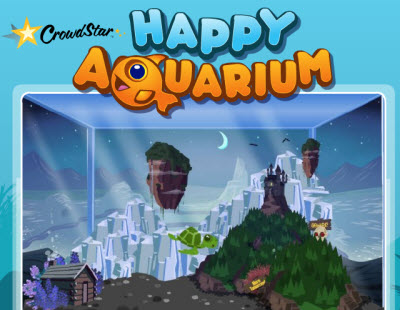
Burlingame, Calif.-based Crowdstar has filed a federal lawsuit accusing WonderHill of unfair competition and copyright violations for copying Happy Aquarium on Facebook. Among the signature features that WonderHill allegedly copied was a “distinctive mating dance to a backdrop of hearts and romantic music.”
[aditude-amp id="flyingcarpet" targeting='{"env":"staging","page_type":"article","post_id":178680,"post_type":"story","post_chan":"none","tags":null,"ai":false,"category":"none","all_categories":"business,games,","session":"D"}']It may sound trivial, but Happy Aquarium is Crowdstar’s bread and butter, attracting more than 26 million monthly active visitors a month (now fallen to about 20 million according to AppData). The game is free to play, but users pay real money for virtual goods in the game, such as fish food. Crowdstar is making millions of dollars from virtual goods purchases in the game, and that has helped it expand its staff dramatically and launch new games.
“There are similar fish games,” said Peter Relan, chairman of Crowdstar. “We understand that. This particular one literally lifts not just the overall game mechanics, but words, the user interface, and even the breeding of the fish. It’s almost like you’re staring at our game. You can tell that somebody said, ‘Copy that screen.’ It’s important we protect our brand and not allow blatant copying.'”
AI Weekly
The must-read newsletter for AI and Big Data industry written by Khari Johnson, Kyle Wiggers, and Seth Colaner.
Included with VentureBeat Insider and VentureBeat VIP memberships.
The suit alleges that Aquarium Life’s user interface is virtually identical to Happy Aquarium’s.
As for copying, Relan said, “I have no tolerance for it. It’s one thing to generally get inspiration from another game. It’s not ok to just lift user interfaces and exact mechanics. It would stifle our own growth. It’s a young industry growing fast. In this case, we have a legal case. In other cases, where it’s legally not a problem, copying is still a business problem for the industry.”
The cloning of games has been a big issue in social games. Zynga cloned FarmTown, a game created by a small game company, with the launch of FarmVille last summer. Zynga’s hit game became far bigger than FarmTown, generating more than 80 million monthly active users. Yet it is hard for the makers of FarmTown to prove a case of copyright infringement, largely because farm games got their start in China.
Lots of video games are new twists on old games. The tremendously creative and popular Plants vs. Zombies game, created by PopCap games, is a derivative of Desktop Tower Defense. But the games are often so different they don’t result in anti-copycat lawsuits. Hence, most lawsuits related to intellectual property in video games tend to focus on the raiding of talent or the theft of actual game code.
James Currier, chief executive of San Francisco-based WonderHill, declined comment. Currier is former chief executive of Tickle. WonderHill’s chief creative officer is Nick Rush, former chief creative officer of Pogo.com and former vice president of creative at iWin. Stan Chudnovsky is chief technology officer. They created WonderHill in 2008 and raised $7 million in 2009.
[aditude-amp id="medium1" targeting='{"env":"staging","page_type":"article","post_id":178680,"post_type":"story","post_chan":"none","tags":null,"ai":false,"category":"none","all_categories":"business,games,","session":"D"}']
VentureBeat's mission is to be a digital town square for technical decision-makers to gain knowledge about transformative enterprise technology and transact. Learn More
